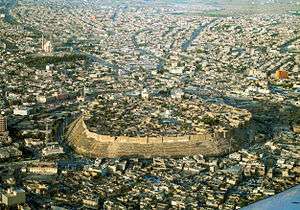Tourism in Iraq

Tourism in Iraq refers to tourism in the Western Asian country Iraq. The capital city Baghdad is the second largest city in the Arab world after Cairo. Iraq has several Islamic pilgrimage sites related to Shia Islam. Iraq is considered to be a potential location for ecotourism.[1] Erbil was chosen as "Arab Tourism Capital" in 2014 by the Arab Tourism Committee.[2]
Religious Tourism
It is the most popular type of tourism in Iraq as millions of tourists from many countries come to many Holy cities and places in Iraq. These include
- Imam Ali A.S. Holy Shrine Imam Ali Mosque in Najaf, with remains of Adam and Noah According to Shi'a belief.
- Imam Husayn A.S. Holy Shrine Imam Husayn Shrine and his brother Abbas ibn AliA.S. in Abbas ibn Ali Shrine in Karbala.
- Imam Musa al-Kadhim A.S. Holy Shrine Al-Kadhimiya Mosque in Kadhimiya in Baghdad.
- Imam Ali al-Hadi and Imam Hasan al-Askari A.S. Holy Shrine Al-Askari Shrine in Samarra.
- Abu Hanifa's Shrine in Baghdad.
- Abdul-Qadir Gilani's Shrine in Baghdad.
- Salman the Persian's Shrine in Al-Mada'in near Baghdad.
- Hudhayfah ibn al-Yaman's Shrine in Al-Mada'in near Baghdad.
- Kumayl ibn Ziyad's Shrine in Najaf.
- Hani ibn Urwa, Muslim ibn Aqeel & Mukhtar al-Thaqafi Shrines in Great Mosque of Kufa in Kufa.
- Al-Sahlah Mosque in Kufa.
- Talhah & Zubayr ibn al-Awam Shrines in Basra.
- Zayd ibn Ali Shrine in Babel.
- Hud (prophet) & Saleh in Wadi-us-Salaam Cemetery in Najaf.
- Dhul-Kifl sanctuary in Hilla.
- Jonah & Seth sanctuary in Mousel.
- Uzair sanctuary in Amarah.
Wellknown cities in religious tourism
Najaf
Amiralmomenin library established by Abdul Hosein Amini and tens of personal and public libraries. Traditional mosques which were teaching centers along the history like Al-Hindi mosque, Al-Tusi mosque. Great Mosque of Kufa where Noah's Ark stopped.
Industry
The number of tourist arrivals in Iraq in 2013 was 892,000. In the last two decades the highest number of tourists came in 2010 with 1,518,000 tourists. In 2012, the value of international tourism receipt was $1.64 billion.[3] Iraqi Kurdistan, an autonomous region of Iraq, was a hotspot for tourism. It was considered to be a safe and stable region and least affected by terrorism. In 2012, Kurdistan recorded a 70% rise in tourist arrivals. In 2007 Kurdistan had 106 hotels which increased to 405 in 2012 in addition to 214 motels and 50 tourist villages.[4][5] Erbil city in Kurdistan which was declared as "Arab Tourism Capital" in 2014. However, as of 2015, activities of the militant group ISIS have affected tourism in Kurdistan. According to the association of hotels, tourism in Kurdistan is going through a crisis. The Governor of Erbil said that the financial crisis of Iraq and the war against ISIS have affected all sectors of the economy including tourism.[6][7]
Attractions
Iraq has four World Heritage Sites recognised by the UNESCO as well as eleven additional sites on the tentative list of UNESCO. All of the World Heritage Sites are cultural, which include Ashur (Qal'at Sherqat), Erbil Citadel, Hatra, and Samarra Archaeological City. The tentative list includes Ur, Nimrud, The Ancient City of Nineveh, The Fortress of Al-Ukhaidar, Wasit, Babylon, The Marshlands of Mesopotamia, The Site of Thilkifl, Wadi Al-Salam Cemetery in Najaf, Amedy city, Historical Features of the Tigris River in Baghdad Rusafa.[8]
See also
References
- ↑ "Iraq: the world's next big eco-tourism destination?". Telegraph. Retrieved 2015-11-18.
- ↑ "Travel and Tourism in Iraq". Euromonitor.com. Retrieved 2015-11-18.
- ↑ "Iraq - International tourism". Indexmundi.com. Retrieved 2015-11-18.
- ↑ "Iraqi Kurdistan records 70% rise in tourism arrivals". GulfNews.com. 2012-08-28. Retrieved 2015-11-18.
- ↑ Newton, Jay (2012-12-31). "Is Iraqi Kurdistan Emerging as a Tourist Hot Spot? | TIME.com". World.time.com. Retrieved 2015-11-18.
- ↑ "Kurdistan tourism devastated by ISIS Iraq chaos". News.com.au. 2015-02-02. Retrieved 2015-11-18.
- ↑ "Iraqi Kurdistan's tourism sector is undergoing its worst stages: association". Ekurd.net. 2015-06-15. Retrieved 2015-11-18.
- ↑ UNESCO World Heritage Centre. "Iraq - UNESCO World Heritage Centre". Whc.unesco.org. Retrieved 2015-11-18.